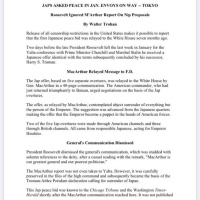exonerate
ex‧on‧e‧rate /ɪɡˈzɒnəreɪt $ ɪɡˈzɑː-/ verb [transitive]
to state officially that someone who has been blamed for something is not guilty
exonerate somebody from/of something
He was totally exonerated of any blame.
(義務、責任などから)免除する、解除する
語源
oner- : L.onus=a load, burden(重荷)
What this outcome is not, however, is a “Complete and Total EXONERATION,” as Mr. Trump unsurprisingly spun it. Mr. Mueller explicitly declined to exonerate the president on the matter of obstruction of justice — a crime that constituted one of the articles of impeachment for both Presidents Richard Nixon and Bill Clinton. After examining Mr. Trump’s actions and weighing “difficult issues” of law and fact, Mr. Mueller punted. “While this report does not conclude that the president committed a crime, it also does not exonerate him,” the report states.
ex‧on‧e‧rate /ɪɡˈzɒnəreɪt $ ɪɡˈzɑː-/ verb [transitive]
to state officially that someone who has been blamed for something is not guilty
exonerate somebody from/of something
He was totally exonerated of any blame.
(義務、責任などから)免除する、解除する
語源
oner- : L.onus=a load, burden(重荷)
What this outcome is not, however, is a “Complete and Total EXONERATION,” as Mr. Trump unsurprisingly spun it. Mr. Mueller explicitly declined to exonerate the president on the matter of obstruction of justice — a crime that constituted one of the articles of impeachment for both Presidents Richard Nixon and Bill Clinton. After examining Mr. Trump’s actions and weighing “difficult issues” of law and fact, Mr. Mueller punted. “While this report does not conclude that the president committed a crime, it also does not exonerate him,” the report states.

























